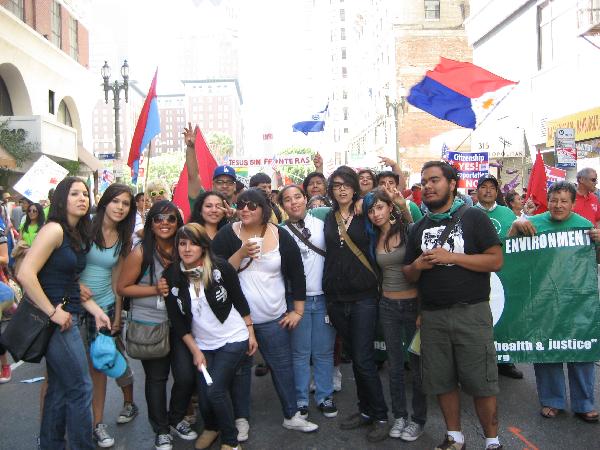by AJLPP
Tuesday, Jan. 13, 2009 at 8:49 AM
ajlpp_socal@yahoo.com 213-241-0906
Filipino couple Rogelio and Wilhemina de Vera, both 72 years old, who live in the “Cambodian projects” on Cherry Street, belong to the approximately 90,000 or almost 20 percent, of Long Beach residents who live under the federal poverty line. Half a million Filipinos make Long Beach or LA County—which ranks sixth in the nation for concentration of poverty—their home.
“I am living paycheck to paycheck which is very hard because I still support some of my relatives back home,” Rogelio, a service van driver at a five-star Long Beach hotel, told Philippine News. “So I really appreciate that some organizations are helping me and my family

img_1079.jpgkdayfy.jpg, image/jpeg, 2816x2112
AJLPP Update
January 10.2008
Filipino hotel workers, among Long Beach’s poorest
Paskie Pascua
LOS ANGELES—Filipino couple Rogelio and Wilhemina de Vera, both 72 years old, who live in the “Cambodian projects” on Cherry Street, belong to the approximately 90,000 or almost 20 percent, of Long Beach residents who live under the federal poverty line. Half a million Filipinos make Long Beach or LA County—which ranks sixth in the nation for concentration of poverty—their home.
“I am living paycheck to paycheck which is very hard because I still support some of my relatives back home,” Rogelio, a service van driver at a five-star Long Beach hotel, told Philippine News. “So I really appreciate that some organizations are helping me and my family.”
Mang Roger and Aling Mina were among thousands of Long Beach and County residents who availed of gifts from nonprofit organizations, like the Long Beach Coalition for Good Jobs & a Healthy Community, last Christmas. Long Beach City Council members Tonia Reyes Uranga and Patrick O’Donnell, as well as a representative from the office of Assembly member Warren Furutani, joined community leaders in the charity distribution drive during the holidays.
Long Beach, who owns one of the world’s largest shipping ports, has a thriving hotel, tourism and arts business, aside from its large oil, aircraft, automobile parts, electronic and audiovisual equipment industry. The city’s hospitality and leisure industry is the third-fastest growing in the city. Long Beach hotels had an occupancy rate of 76 percent, higher than 24 of the 26 largest US hotel markets, according to recent studies.
Hotel, tourism and arts workers in Long Beach make $19,240 a year on average, approximately $2000 below the federal poverty line. Of the approximately 2,600 hotel workers in Long Beach, few are able to afford health insurance and are scraping by this holiday season, says a Coalition statement. A preliminary survey conducted in September of hotel workers in Long Beach revealed that approximately 38 percent of these workers are on some public assistance and 39 percent are without health insurance.
These workers include the De Veras. Wilhelmina has been toiling as housekeeper in another hotel for eight eight years now, but “still very, very poor.” Their apartment unit has no ventilation or heating; and the residential building itself reminds a Filipino of the impoverished residential enclaves in Manila. The couple falls in what Philippine sociologists refer to as “urban poor.”
Long Beach hospitality workers often report doing the job of two or three people and suffering from chronic injuries. María Patlán, who has worked for 10 years as a housekeeper at the Hilton Long Beach and also resides in the city, makes only $10.20 per hour. Having been injured three times at work, she says that the most difficult part of her work is “to do my job while in pain. I do the work of two people.”
In the past three years, Patlán has been forced to use food stamps and free or reduced-price school meals to feed her family. For her, it was extremely difficult to not have the money to pay for her daughter’s first semester of college.
At a July 10 march for Long Beach hotel workers attended by over 700 community, labor and religious leaders, Vice Mayor Bonnie Lowenthal expressed support for the new effort to raise standards in the hotel industry.
“I am proud to support workers in our hospitality industry in their fight for decent wages and health benefits,” said Lowenthal. “The city of Long Beach depends greatly on our tourism industry, and these workers keep this industry going. Fair is fair. They should not bear this burden while hotels benefit.”
The Long Beach Coalition for Good Jobs and Healthy Communities is a broad-based coalition of community, faith and labor leaders and organizations seeking to improve conditions for their fellow residents, the tourism industry and the city as a whole.
Among its members are Cal State University Long Beach Sociology Professors Kristine M. Zentgraf, PhD and Norma Chinchilla, PhD; Annette Quintero of the Long Beach Immigrant Rights Coalition; Connie McFall of the Unitarian Universalist Church of Long Beach; Sandra Kroll of Long Beach Coalition for the Homeless; Daniel Salana of KMB; Arturo P. Garcia of Justice for Filipino American Veterans; UNITE HERE Local 11; Los Angeles Alliance for a New Economy; and Clergy and Laity United for Economic Justice.
[For more information, visit: www.GoodJobsLongBeach.org]

